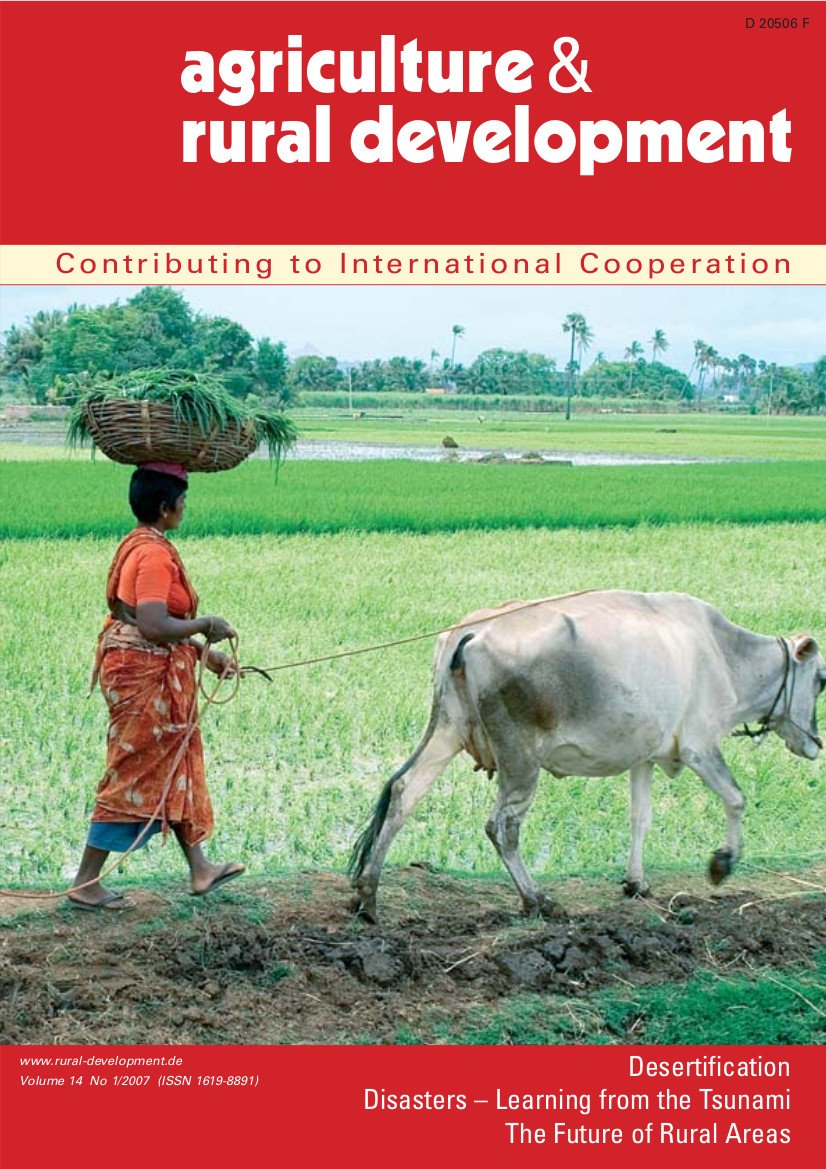Location
The international journal Rural 21 has dedicated more than 40 years to all topics surrounding rural development. Its ambition is to further those strategies and policies that strengthen rural areas of developing and newly industrialising countries and encourage their implementation. The journal addresses the complete range of relevant themes – from agriculture and fisheries via capacity building and education through to health and social security, energy supply and trade. Center-stage is always devoted to inquiring into how measures and strategies can contribute to global food security and to reducing poverty.
Rural 21 desires to further the dialogue between science and politics, the private sector, civil society and practitioners. Two platforms are designed for this purpose: Rural 21 in print is published four times a year, each issue highlighting a specific focus of rural development – this print edition is read in more than 150 countries. In parallel, Rural 21 online keeps the rural development community up to date on news and events, scientific findings and other print and online publications.
Rural 21 is published by DLG-Verlag GmbH in Frankfurt/Germany. Financial partners are BMZ (German Federal Ministry for Economic Cooperation and Development), GIZ (Deutsche Gesellschaft für Internationale Zusammenarbeit), DLG (German Agricultural Society – Deutsche Landwirtschaft-Gesellschaft), SDC (Swiss Agency for Development and Cooperation) and Helvetas Swiss Intercooperation.
The first issue of Rural 21 dates back to 1968. From 1974 to 2007, the journal was published in three languages entitled "entwicklung & ländlicher raum" / "agriculture & rural development" / "agriculture & développement rural". In 2008, the journal was relaunched as "Rural 21".
Members:
Resources
Displaying 311 - 315 of 319What makes a disaster even more disastrous? Disaster Reduction is possible.
2005 was a year of natural disasters.The impacts of the tsunami in the Indian Ocean, Hurricanes Katrina and Stan, and the Pakistan earthquake prompted calls for better disaster prevention and preparedness systems. Nature's power renders us impotent, but human actions and omissions are clearly worsening the impacts of disasters in some cases.This is where risk reducing measures must lock in, as the last fifteen years of international disaster risk management show.
Global trends and the future of rural areas
Rural areas are not exempted from the impacts of globalisation. Global trends affecting agriculture are particularly significant in this respect. A number of options are available to developing countries in responding to these trends. Given the scarcity of resources it is important that they choose carefully. If they fail to respond, rural areas will become even more marginalized than they are already.
The right to food - A new legal instrument is created
In November 2004, after a two-year drafting process, the FAO Council adopted the Voluntary Guidelines on the right to food - in effect, a new legal instrument for defending and enforcing the right to food.This article addresses the following questions:
What will this instrument be capable of achieving? Will the effort expended in creating the Guidelines prove to have been worthwhile? And, finally, will the implementation of this new approach to human rights contribute towards reducing the numbers of people suffering from hunger?
Implementing the Voluntary Guidelines: challenges and options
Following unanimous approval of the Voluntary Guidelines (VGs) on the Right to Adequate Food by FAO member states, with civil society's broad support, the question of «next steps» arises. To explore how to put this important new tool to use, the German government, with support from FAO and German NGOs, organized its fourth International Workshop on «Policies Against Hunger», held in June 2005 in Berlin.
Regional aspects - Desertification in the Middle East and North Africa. Warning signs for a global future?
Desertification is nowhere more serious than in the Middle East and North Africa (MENA), stretching from Pakistan in the east to Morocco in the west, and from Ethiopia and Sudan in the south to Turkey in the north. Yet, many MENA countries have successfully rehabilitated large areas. Concerted efforts can indeed stop and even reverse desertification, though their long-term success will depend on how well they manage their limited water resources.



